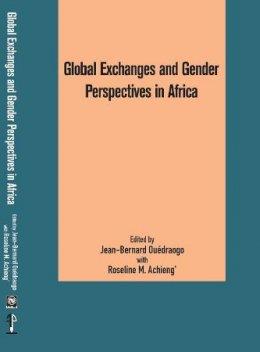Global Exchanges and Gender Perspectives in Africa
Mots-clés :
Échanges mondiaux, Genre, idéologie libérale, légitimation idéologiqueSynopsis
The global perspectives adopted in this volume by the authors, from different academic disciplines and social experiences, ought not to be locked in sterile
linearity which within process of globalisation would fail to perceive, the irreversible opening up of the worlds of the south. There is the need within the framework of the analyses presented here, to quite cogently define the sense of the notion of the market. The market here does not refer to saving or the localised exchange of goods, a perspective which is imposed by normative perceptions.
In fact, a strictly materialistic reading of exchange would be included, since every social practice and interaction implies a communitarian transaction; meanwhile the exchange system under study here broadens to root out the obligation of the maximisation of mercantile profit from the cycle of exchange.
Trade here would have a meaning closer to those of old, one of human interaction, in a way that one could also refer to “bon commerce” between humans.
In one way, trade places itself at the heart of social exchanges, included the power of money, and is carried along by a multitude of social interactions. The
reader is called upon to take into account the major mercantile formations of the social trade system, the market society, without forgetting the diversity of
exchange routes as well as the varying modalities of social construction, at the margins and within market logics – those of implicit value in trade between
humans – which the texts herein also seek to review.
The age-old project of restructuring the domestic economy, the market society as it has developed in the West, – whence it has set out to conquer the whole
wide world – places at the very centre of the current capitalist expansion the challenge of imperatively reshaping gender identity, inter alia, in market relations.
Chapitres
-
Prelim
-
Introduction: Gender in a Global Market Society?
-
The Difference in the System of the Self: A Philosophical Contribution to the Gender Approach
-
‘Celebrating’ the Female Body in Global Trade: Fashion, Media and Music in Kenya
-
The Impact of Globalization on Women Peasants and Traders in Nigeria’s Delta Region (1986 – 2002)
-
Globalization and the Question of Women Smugglers in East Africa: Observations of a Cross Kenya-Uganda Boundary (1980 – 2002)
-
Gender and Fair Trade in Cameroon
-
Trade and Information Systems: The Case of Wrap Sellers in Brazzaville (Congo)
-
The Role of Social Capital in the Establishment and Sustenance of Women’s Micro-businesses: A Case Study of Butere-Mumias District, Kenya
-
Gender, Trade Liberalisation and the Multilateral Trading System: Towards an African Perspective
Téléchargements
Références
Cagatay, N., 2001, Trade, Gender and Poverty, Background Paper, New York: UNDP.
Dam, K. W., 1970, The GATT: Law and International Economic Organization, Chicago: University of Chicago Press.
Durano, M., 1999, Gender Issues in International Trade, International Gender and Trade Network.
GERA Programme 2000, Demanding Dignity: Women Confronting Economic Reforms in Africa, edited by Dzodzi Tsikata and Joanna Kerr with Cathy Blacklock and Jocelyne Laforce, The North-South Institute and Third World Network-Africa.
Olaka-Onyango and Udagama, 2001, ‘Globalization and Its Impact on the Full Enjoyment of Human Rights’, Progress report to the UN Sub-Commission on the Promotion and Protection of Human Rights, 53rd Session, 2 August 2001. E/CN.4/Sub.2/2001/10.
Raghavan, C., 2001, ‘Historical Evolution and Changing Perceptions of the Trading System’, Unpublished paper, Geneva.
Rodrik, D., 2001, ‘The Gl obal Governance of Trade As If Development Really Mattered’, Background Paper, New York: UNDP.
Standing, G., 1989a, Global Feminisation Through Flexible Labour, World Development 17, No 7.
Standing, G., 1989b, Global Feminisation Through Flexible Labour: A Theme Revisited, World Development 17, No 7.
Third World Network, 2001, ‘The Multilateral Trading System: A Development Perspective’, Background Paper, New York: UNDP.
Tsikata, D., 2001, ‘Trade and Investment Policy in Africa: A Gender Analysis’, Presentation at the GERA Regional Training Workshop on Gender, Trade and Investment in Africa, 27 June- 5 July 2001, Accra.
UNCTAD, 1999, Trade and Development Report, Geneva.
Williams, M., 2001, ‘Imbalances, Inequities and the WTO Mantra’, DAWN Discussion Paper II on the WTO.






